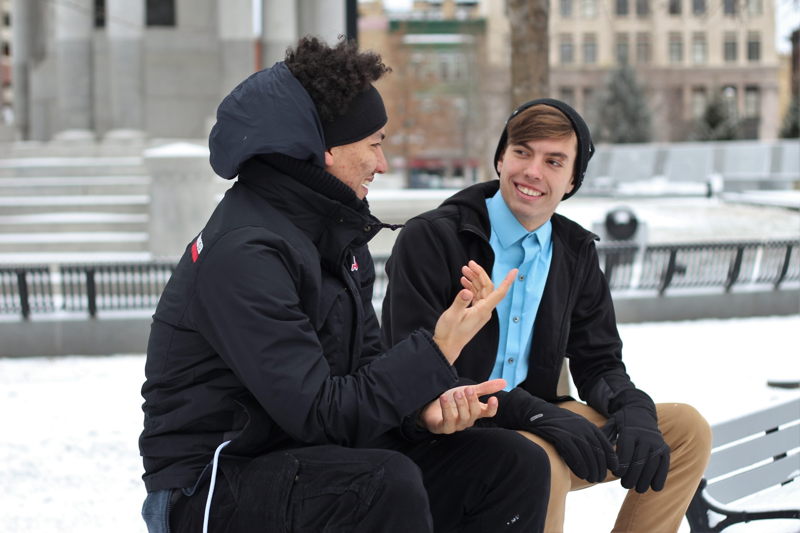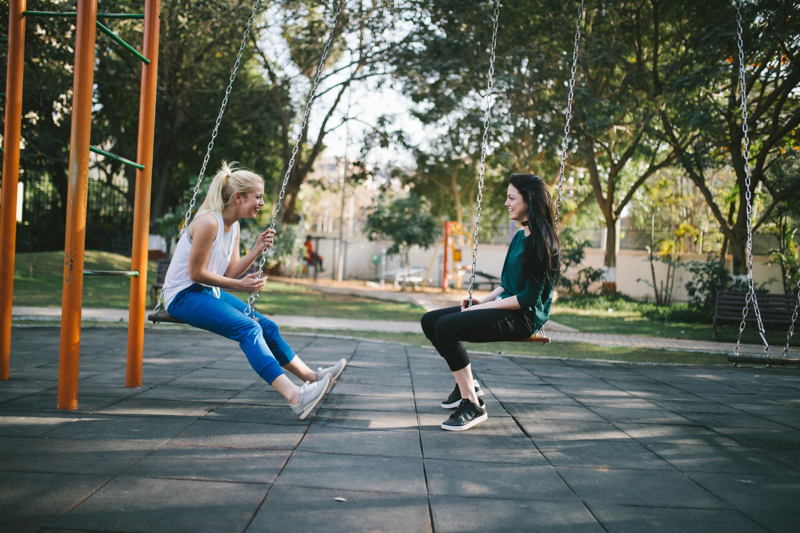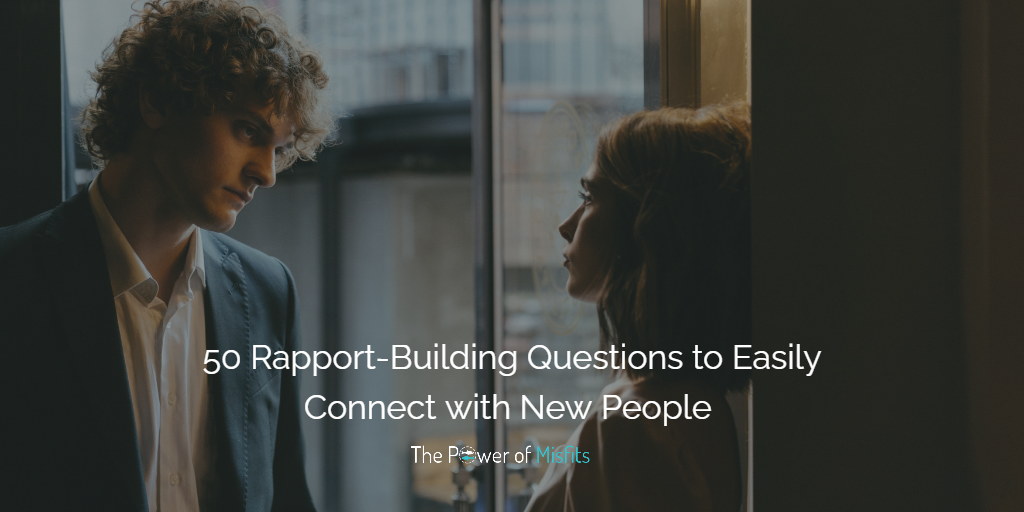How do you build rapport with people you have never met? We all want to get on with people, after all, no one deliberately invites conflict into their lives. And while it is true that roughly 70% of all communication is through body language, you still have to speak. You have to start the conversation somehow.
If you are anything like me, you get a little nervous around new people. You worry; will the conversation falter, will I run out of things to say, what if they get the wrong impression of me?
Here is where psychology comes into play. Luckily, there are rapport-building questions that instantly connect you to a new person.
There’s one more thing I need to talk about after the questions part of this article. If you want to build a rapport, (with questions or any other type of communication), it helps to know the core basics of rapport building.
What is rapport?
The dictionary defines rapport as:
‘…a close and harmonious relationship in which the people or groups concerned understand each other’s feelings or ideas and communicate well.’
So what does that mean in real-life situations?
If you have a rapport with another person, you know them on a unique, personal basis. You understand them, you know what makes them tick, their likes and dislikes, what makes them laugh, their moral code, values, and beliefs. In other words, you have the inside track of this person.
Now, there are many people in life we have a rapport with, mainly because we have spent time with them. I’m talking about family and friends, but new people are a blank page to us. We know nothing about them. That’s where rapport-building questions are vital.
Questions that build rapport quickly establish a friendly and amicable relationship. Asking the right questions allows us to develop rapport. They let us delve beneath the surface and connect on a more satisfying and deeper level.
50 rapport-building questions
Ice breakers

- “What’s it like living in (town/city). Do you visit the (main attractions/shopping mall)?”
- “I love your nails, do you get them done locally?”
- “I hear you run an art gallery in town. Do you pick the artwork yourself?”
- “Your garden always looks immaculate. Do you have any tips?”
- “Do you work from home or commute?”
- “The weather here is atrocious. What’s it like where you are?”
- “I’ve heard good things about that new restaurant in town, have you been?”
- “Your tattoo is so intricate. How long did it take to do?”
- “I heard that you lived in (town/city). Why did you move?”
- “What kind of books do you read, and have you got any recommendations?”
- “Did you see the last Bond film? What did you think about it?”
- “How do you know (the person they know)? Is she/he a good friend?”
- “Have you always lived in this area?”
Once you have broken the ice
- “What is your greatest accomplishment?”
- “What advice would you give to your younger self?”
- “How would you spend a big lottery win?”
- “Did you always want to work as a (person’s profession)?”
- “What bands have you seen live, and who was best?”
- “If you could live anywhere in the world, where would you go?”
- “What is your favorite holiday destination?”
- Who would you want to play you in a film of your life?”
- What is the first thing you would save if your house was burning?”
- “Are you a dog or a cat person?”
More personal rapport-building questions
- “What’s the best thing that has ever happened to you?”
- “I saw on Twitter that you are interested in (topic/subject). Are you going to the (event) next week?”
- “I see that you are a (sports team) fan. Do you see them play regularly?”
- “You posted a link to (topic), it was really interesting. Do you have others?”
- “I heard (their friend, family member, colleague) was ill. How are you coping?”
- “What are you most looking forward to this year?”
- “I saw on your Instagram page that you post a lot of dog pictures. Where do you get the doggie outfits from?”
- “My children go to the same school as yours. Have you ever enrolled yours in any after-school clubs?”
- “Do you have anything exciting planned this year?”
- “I see you are going to (something advertised on social media). Have you been before?”
- “I saw on social media you were selling children’s toys. Is it a good way to get rid of unwanted stuff?”
- “What’s the most important thing you’d want someone to know about you?”
Employment

- “How do you like to be addressed?”
- “If you could do any job in the world, what would it be?”
- “I see you worked at (xxx company). What was the interview process like?”
- “My son would love to get into (person’s profession). Do you have any advice?”
- “I saw your profile on LinkedIn and read that your major was in Psychology. I’ve always been interested in that field. What was the course like?”
- “I’ve heard lots of stories about (person’s employment/company). What’s it like to work there?”
- “Are you planning on moving up the ranks or are you happy where you are?”
- “I read your blog on (person’s subject). How did you get into blogging?”
- “I’d love to work in your field. What qualifications would I need?”
- “I see you worked at (previous profession). What made you leave?”
Fun/thought-provoking
- “What do you do for fun?”
- “What would your ideal day off look like?”
- “Did you grow up here?”
- “if you could have any superpower, what would it be?”
Rapport building rules

Except for the actual questions, there are a couple of basic rules you need to keep in mind.
1. Remember and use people’s names
Remembering and using the other person’s name instantly builds rapport. I am always pleasantly surprised when a relative stranger or someone I’ve just met uses my name. It shows they are paying attention.
Names are our identities, so using a person’s name immediately creates a connection. It is also the first step to building rapport. Remembering and using the other person’s name instantly builds rapport.
2. Use active listening
Active listening will help deepen a connection you are trying to make.
“When people talk, listen completely. Most people never listen.” – Ernest Hemingway
So, instead of thinking about your answer while the person is talking, actually listen to what they say. Then you can follow up the conversation, building on what you have heard.
For example; if the other person says:
“I went to a great music festival last weekend!”
Instead of you replying:
“Oh I love festivals, I went to one last year.”
You build on what they have told you, so you probe their initial statement. Your task is to get more information from them.
3. Ask follow-up questions
Let’s use the above festival example again. The person has said:
“I went to a great music festival last weekend!”
You can now ask follow-up questions such as:
“Wow, that sounds amazing, who was playing? Who did you go with? What was the venue like? Would you go again?”
When you actively listen, you take in information, instead of formulating your reply.
I have listened to many people talking, and it is obvious neither one is really listening to the other person. It is one-sided. They just want to get their story or point across. This isn’t a conversation. It is simply two people talking at each other.
Active listening lends itself to probing on a deeper level into what the person is talking about. So pay attention to what the person is saying and think about how they can open up more about the topic.
4. Connect with your own experiences

So, where do you go from here? You have actively listened, and asked probing questions that help build rapport. Now is the time to add your own experiences to the conversation. Find something you have in common by sharing a similar experience.
Let’s take that festival example one more time:
“I went to a great music festival last weekend!”
“Wow, that sounds amazing, who was playing?:
“It was a group of local bands.”
“Oh, I saw that advertised but I wasn’t sure about going. Who did you go with?”
“There was a group of us from Facebook. We have been following this one band in particular.”
“Was that the headlining band? I’ve heard good things about them.”
“Yes, they are pretty amazing, especially their acoustic set.”
“I love it when bands do acoustic sets, I saw (band name) at Coachella last year and they were incredible.”
5. Use open body language
It’s all very well practising how to ask rapport-building questions, but if your body language is off, you won’t get very far.
Use an open position when sitting or standing. This means uncrossing your arms, standing with your feet apart, facing the person, and making good eye contact.
You can also mirror their body language. This is a subtle technique that makes someone instantly at ease. For example, if they are leaning up against a wall, do the same. If they lean towards you, lean in their direction as well.
As well as mirroring the person’s body language, you can also mirror their speaking language. So if they use certain terms, for example, calling a boy a lad, or a girl a lass, mimic their language.
However, research suggests that using both verbal and non-verbal techniques could be counter-productive:
“It was a bit of a surprise to find that using verbal and non-verbal techniques together backfired. In hindsight it was probably seen as forced or too much, making the interviewee feel that any rapport that resulted was fake. The bottom line is that using one technique or the other is better than neither or both.” – Eric Novotny, lead author, Grady College of Journalism and Mass Communication
Finally, be wary of becoming distracted during the conversation. Our body language gives us away when we are becoming disinterested. We might fidget, look past the person we are speaking to, or even take a sneaky glance at our watch or phone.
6. Be open-minded
Not everyone shares our beliefs, but we all think we are right. The best kinds of rapport-building questions allow the other person to answer honestly and without judgment.
Questions for building rapport are great, but there is one more important thing to remember: never offer advice unless you are asked for it.
If you are asked, start with a positive, add any negative comments in the middle, and end with another positive. That way you’ll keep your new friends instead of pushing them away.
Final thoughts
I hope I have given you good advice and examples of rapport-building questions. Why don’t you try them the next time you meet a new person!
References:


